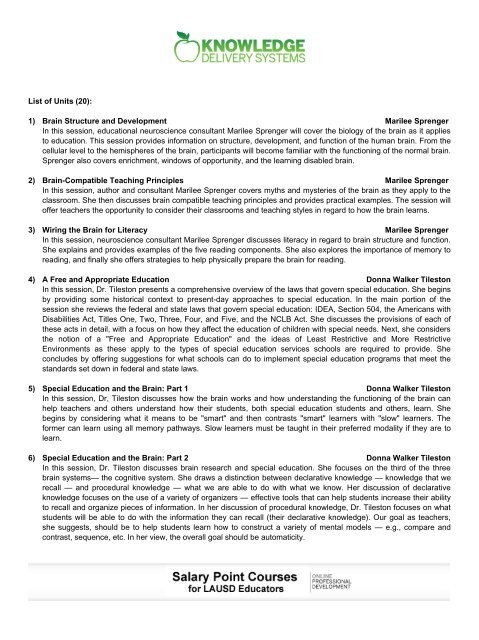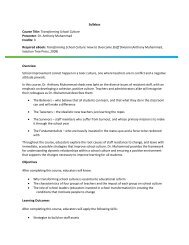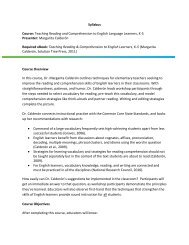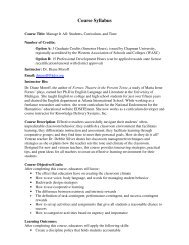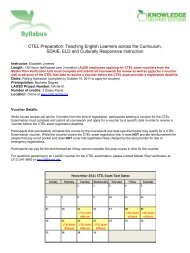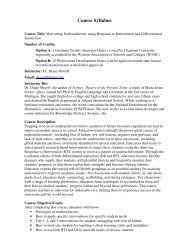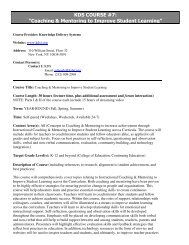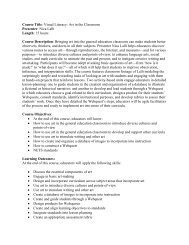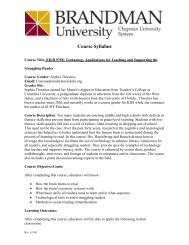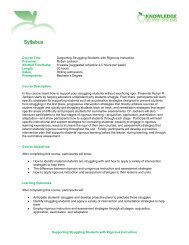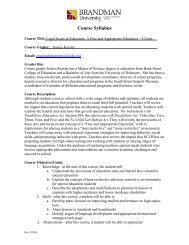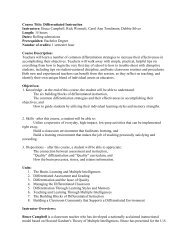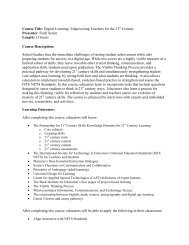Course Syllabus Aiding Students with Learning Disabilities
Course Syllabus Aiding Students with Learning Disabilities
Course Syllabus Aiding Students with Learning Disabilities
You also want an ePaper? Increase the reach of your titles
YUMPU automatically turns print PDFs into web optimized ePapers that Google loves.
List of Units (20):<br />
1) Brain Structure and Development Marilee Sprenger<br />
In this session, educational neuroscience consultant Marilee Sprenger will cover the biology of the brain as it applies<br />
to education. This session provides information on structure, development, and function of the human brain. From the<br />
cellular level to the hemispheres of the brain, participants will become familiar <strong>with</strong> the functioning of the normal brain.<br />
Sprenger also covers enrichment, windows of opportunity, and the learning disabled brain.<br />
2) Brain-Compatible Teaching Principles Marilee Sprenger<br />
In this session, author and consultant Marilee Sprenger covers myths and mysteries of the brain as they apply to the<br />
classroom. She then discusses brain compatible teaching principles and provides practical examples. The session will<br />
offer teachers the opportunity to consider their classrooms and teaching styles in regard to how the brain learns.<br />
3) Wiring the Brain for Literacy Marilee Sprenger<br />
In this session, neuroscience consultant Marilee Sprenger discusses literacy in regard to brain structure and function.<br />
She explains and provides examples of the five reading components. She also explores the importance of memory to<br />
reading, and finally she offers strategies to help physically prepare the brain for reading.<br />
4) A Free and Appropriate Education Donna Walker Tileston<br />
In this session, Dr. Tileston presents a comprehensive overview of the laws that govern special education. She begins<br />
by providing some historical context to present-day approaches to special education. In the main portion of the<br />
session she reviews the federal and state laws that govern special education: IDEA, Section 504, the Americans <strong>with</strong><br />
<strong>Disabilities</strong> Act, Titles One, Two, Three, Four, and Five, and the NCLB Act. She discusses the provisions of each of<br />
these acts in detail, <strong>with</strong> a focus on how they affect the education of children <strong>with</strong> special needs. Next, she considers<br />
the notion of a "Free and Appropriate Education" and the ideas of Least Restrictive and More Restrictive<br />
Environments as these apply to the types of special education services schools are required to provide. She<br />
concludes by offering suggestions for what schools can do to implement special education programs that meet the<br />
standards set down in federal and state laws.<br />
5) Special Education and the Brain: Part 1 Donna Walker Tileston<br />
In this session, Dr, Tileston discusses how the brain works and how understanding the functioning of the brain can<br />
help teachers and others understand how their students, both special education students and others, learn. She<br />
begins by considering what it means to be "smart" and then contrasts "smart" learners <strong>with</strong> "slow" learners. The<br />
former can learn using all memory pathways. Slow learners must be taught in their preferred modality if they are to<br />
learn.<br />
6) Special Education and the Brain: Part 2 Donna Walker Tileston<br />
In this session, Dr. Tileston discusses brain research and special education. She focuses on the third of the three<br />
brain systems— the cognitive system. She draws a distinction between declarative knowledge — knowledge that we<br />
recall — and procedural knowledge — what we are able to do <strong>with</strong> what we know. Her discussion of declarative<br />
knowledge focuses on the use of a variety of organizers — effective tools that can help students increase their ability<br />
to recall and organize pieces of information. In her discussion of procedural knowledge, Dr. Tileston focuses on what<br />
students will be able to do <strong>with</strong> the information they can recall (their declarative knowledge). Our goal as teachers,<br />
she suggests, should be to help students learn how to construct a variety of mental models — e.g., compare and<br />
contrast, sequence, etc. In her view, the overall goal should be automaticity.


